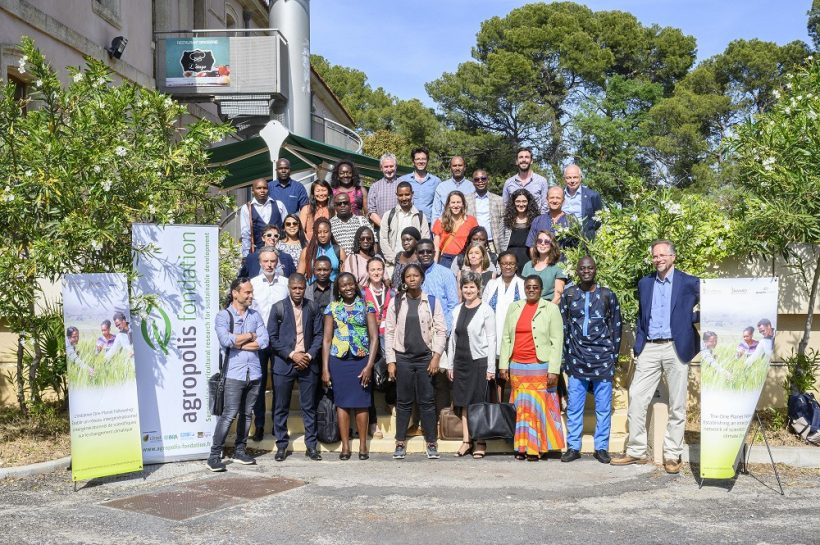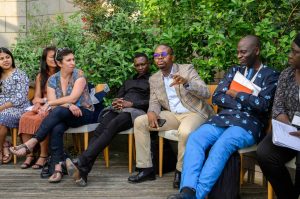

This week, select One Planet Laureate Candidates, their Mentors, Research Supervisors, European Learning Partners, and implementing partners are convening in Montpellier, France, to take stock of their participation as they forge their next steps in the One Planet Fellowship.
A science forum, the convening is a culmination of a two-week study tour for the Laureate Candidates and their mentors. They visited various research and development institutions in Belgium, France, and Italy.
Before they can lead climate change adaptation solutions, African researchers must first be scientists of uncompromising quality. As such, strengthening the scientific research skills of the researchers is a critical component of the Fellowship. The study tour was part of the laureate candidates’ engagement toward Advanced Science Training (AST), a key component through which the Fellowship is strengthening the laureate candidates’ scientific skills.
During the AST, laureate candidates are paired with seasoned research supervisors in state-of-the-art European institutions who provide guidance, sharing their expertise and networks.
The long-standing global emphasis on multistakeholder collaboration to foster research and innovation-based development is well known. The science forum participants noted that partnerships are imperative. Professor Sheila Okoth, the One Planet Fellowship Science Advisor, said that the Fellowship emphasizes research collaborations because we all have a common denominator, one planet. Sheila noted that the Fellowship equips its participants to prioritize their research, ensuring the development of relevant innovations.
Presenting their learnings and priorities at the science forum, the laureate candidates highlighted how they have benefited from the research groups created under the Fellowships. The research groups are one way through which the One Planet Fellowship incentivizes research collaborations among the participants, fostering pan-African intracontinental collaboration. Some of the outcomes of these collaborations include joint publishing, such as these recent studies, and joint fund-raising efforts that are underway.
Dr. Edwige Some Tiertou, a Laureate Candidate from Burkina Faso, said she was looking forward to her participation in the AST to enhance her skills in designing options to build farmers’ resilience against climate change and engaging policymakers for widespread uptake of her research. Edwige will be undertaking her AST at the University of Montpellier.
There has been a growing momentum in research collaboration and strong financing collaboration between the private sector, civil society, public research, and private philanthropy. Speaking at the science forum, Ms. Delphine Gluzman from the BNP Paribas Foundation highlighted that the low philanthropy for climate research is an opportunity to intensity innovative private-public partnerships such as blended financing.
Dr. Austin Phiri, a One Planet Laureate Candidate from Malawi who recently completed his four-month-long AST at Sassari University in Italy, expressed his enthusiasm following the new soil crop modeling skills he acquired, which he is keen to apply in his work on soil fertility research.
Working toward sustainability of climate research, the One Planet Fellowship invests in building cross-continental, intergenerational, and cross-disciplinary networks of scientists. The science forum included the participation of research supervisors who presented their research priorities and the latest research trends and shared some of the issues that need to be urgently addressed for successful interventions toward fighting climate change.
Dr. Nina Graveline from the University of Montpellier noted the need to invest in documenting the impacts of climate change and the progress and the need to foster interdisciplinary and participatory research for more concerted efforts.
Dr. Wouter Vanhouve from Ghent University singled out the need for a joint focus on climate justice as vulnerable populations continue to face the double whammy of economic and social consequences of climate change.
The One Planet Fellowship is among more than 40 coalitions of the One Planet Summit accelerating the objectives of the Paris Agreement by building a robust pipeline of African researchers equipped to lead climate change research in Africa. In addition to the research supervisors and mentors, the laureate candidates are paired with emerging European and African scientists under the age of 30 years, known as Learning Partners, to whom they serve as mentors. This model creates an intergenerational network of global researchers addressing the multidimensional impacts of climate change. Since its launch in 2019, the Fellowship has reached 260 direct beneficiaries from 77 institutions in 14 African countries. African Women in Agricultural Research and Development (AWARD) and Agropolis Fondation co-implement the Fellowship.
